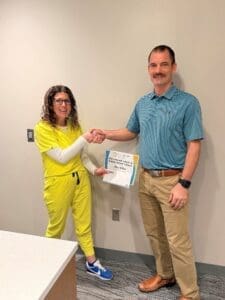Ten states have joined the federal government to sue major pesticide makers, contending that the companies effectively shut off farmers from cheaper, generic products.
Kansas is sitting out the case even though nearby farm states — including Nebraska, Iowa and Texas — signed on.
Kansas Attorney General Derek Schmidt’s office declined an interview on the matter.
“The litigation remains under review,” a spokesperson said by email.
The Kansas Farmers Union cheered the lawsuit as evidence that federal antitrust agencies are turning some long-overdue attention to agriculture issues that frustrate its members — primarily smaller, family-run farms.
“If you’re taking money out of the farmer’s pocket, that’s taking money out of a community as well,” executive director Nick Levendofsky said. “That’s what has been happening in rural America for so many years.”
The more powerful lobbying group Kansas Farm Bureau, which has endorsed Schmidt for governor, declined to comment.
The pesticide market and generics
Pesticide makers can patent their chemicals, but competitors can step in after 20 years to sell generic versions that drive prices down.
The lawsuit filed by the Federal Trade Commission and 10 state attorneys general says two of the biggest pesticide makers in the world found illegal ways to undermine competition for certain chemicals long after their patents expired.
That includes paying distributors to prevent farmers from using cheaper versions of their products. They use loyalty programs that reward distributors for suppressing sales of generics, the suit says.
That locks farmers into overspending millions of dollars annually on their products, the FTC and state attorneys general claim.
The alleged scheme resembles how the pharmaceutical industry undermines price pressures to keep profits soaring.
The two companies involved, Corteva and Syngenta, deny the lawsuit’s claims and say their programs for distributors benefit U.S. farmers.
“This case threatens the pro-competitive investments that Corteva makes and that growers rely on to protect America’s crops,” a spokesperson said. “We are confident that we will prevail in this litigation.”
Syngenta says the incentives targeted in the lawsuit have existed for decades.
“Syngenta strongly disagrees with the FTC’s complaint,” a spokesperson said. “We are disappointed that the FTC has failed to appreciate the beneficial effects that these rebate programs provide.”
The 10 states that joined the lawsuit are California, Colorado, Illinois, Iowa, Indiana, Minnesota, Nebraska, Oregon, Texas and Wisconsin.
Consolidation
U.S. farmers spend more than $10 billion a year on pesticides.
Indiana-based Corteva and Chinese-owned Syngenta are two of the four global companies that dominate the crop seed and pesticide market.
James MacDonald, a professor of agricultural and resource economics at the University of Maryland, said industry consolidation picked up speed about 30 years ago and was fueled by intellectual property laws that allowed companies to patent genetically modified seeds.
He thinks the first few decades of the trend spurred new research and products that benefited farmers.
“It gave them better seeds, gave them better chemicals,” said MacDonald, who for two decades led a branch of the U.S. Department of Agriculture’s Economic Research Service that focused on farm sector issues such as seeds and chemicals.
Companies developed plants designed to fend off insects, or to resist particular herbicides that farmers could use to kill off weeds without hurting crops.
But around 2016, several new mergers and acquisitions began. The remaining big six players — Dow, Dupont, Bayer, Monsanto, Syngenta and BASF — became four global powerhouses that each sold seeds designed to work in tandem with their crop chemicals.
Today, the industry’s four biggest corporations are Corteva, Syngenta, Bayer and BASF.
MacDonald said it remains to be seen how these latest mergers affected competition and prices. Antitrust regulators in the U.S. and Europe forced the corporations to spin off some of their operations in an effort to prevent monopolies.
The issues raised in the new FTC lawsuit don’t relate to those mergers, he said, but do likely reflect the scale of profits that companies earn on certain pesticides.
“In particular, how much money they’re making on their patented product that they would be willing to share some fraction of it with the distributors, rather than just let competition work its way out,” he said. “That says to me that these patented products are extremely valuable.”
The FTC says Corteva and Syngenta pay distributors enough in incentives that turning down those rewards to sell generic products becomes a losing proposition.
“Distributors profit more from accepting Defendants’ exclusion payments than they would from distributing lower-priced generic products in substantial volumes,” the lawsuit says.
Kansas News Service stories and photos may be republished by news media at no cost with proper attribution.
Celia Llopis-Jepsen covers the environment for the Kansas News Service. You can follow her on Twitter @celia_LJ or email her at celia (at) kcur (dot) org.
The Kansas News Service is a collaboration of KCUR, Kansas Public Radio, KMUW and High Plains Public Radio focused on health, the social determinants of health and their connection to public policy.













